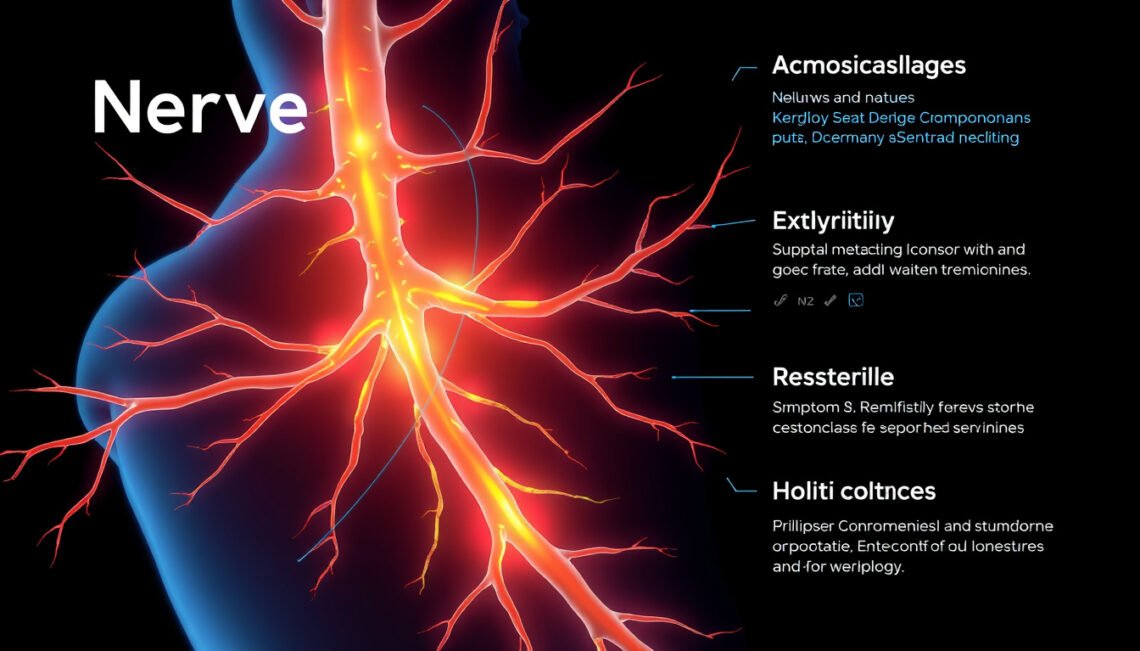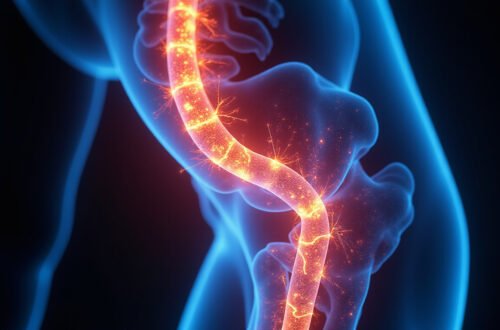Nerve irritation is a common yet often misunderstood condition that can significantly impact your daily life. Whether it’s a sharp pain, tingling sensation, or numbness, nerve irritation can stem from various causes and require different approaches for relief. In this article, we will delve into what nerve irritation is, explore its causes, discuss typical symptoms, and outline effective treatment options to help you regain comfort and mobility.
What Is Nerve Irriation?
Nerve irritation occurs when a nerve becomes inflamed, compressed, or otherwise compromised, leading to abnormal sensations or pain. Unlike nerve damage, which involves permanent injury, nerve irritation is often reversible with appropriate treatment. It is a common contributor to conditions like sciatica, carpal tunnel syndrome, and radiculopathy. Understanding nerve irritation is vital for effective intervention and symptom management.
Causes of Nerve Irritation
Numerous factors can lead to nerve irritation. Recognizing these causes helps in early diagnosis and tailored treatment plans. Here are some of the most prevalent contributors:
1. Herniated Discs
A herniated or slipped disc occurs when the inner core of a spinal disc protrudes through its outer layer, pressing on nearby nerves and causing irritation. This is a frequent cause of lower back and neck nerve discomfort.
2. Poor Posture and Repetitive Movements
Prolonged improper posture, such as slouching at a desk, or repetitive tasks like typing can cause strain and inflammation around nerves, especially in the neck and wrists.
3. Trauma or Injury
Accidents, falls, or sports injuries can result in nerve irritation through direct trauma or swelling in affected tissues.
4. Degenerative Diseases
Conditions like osteoarthritis or spinal stenosis can reduce space in the spinal canal, compressing nerves and causing irritation.
5. Infections and Illnesses
Certain infections, such as shingles, can inflame nerves and produce nerve irritation symptoms.
6. Diabetes
Uncontrolled blood sugar levels may lead to diabetic neuropathy, where nerves become damaged or irritated over time.
7. Tumors and Growths
Abnormal growths near nerves can exert pressure, leading to irritation.
Recognizing the Symptoms of Nerve Irritation
The symptoms of nerve irritation can vary depending on the affected nerve and the severity of irritation. Common signs include:
- Sharp or burning pain
- Tingling or prickling sensations (pins and needles)
- Numbness or reduced sensation
- Muscle weakness
- Sensitivity to touch
- Loss of coordination or balance
For example, nerve irritation in the lower back may cause sciatica, characterized by radiating pain down the leg. Meanwhile, nerve issues in the wrist might result in carpal tunnel syndrome, leading to hand numbness and tingling.
Diagnostic Approaches
Proper diagnosis involves a detailed medical history, physical examination, and sometimes imaging tests like MRI or CT scans. Electromyography (EMG) can assess nerve and muscle function. Consulting a healthcare professional ensures accurate diagnosis and personalized treatment.
Treatment Options for Nerve Irritation
Managing nerve irritation involves addressing the root cause and alleviating symptoms. Here are several effective treatment strategies:
1. Conservative Treatments
Most cases can be managed with non-invasive approaches:
- Rest and Activity Modification: Avoid activities that worsen symptoms.
- Physical Therapy: Tailored exercises can reduce nerve compression, improve posture, and strengthen surrounding muscles.
- Medications: Over-the-counter pain relievers such as NSAIDs, or prescription medications for nerve pain like gabapentin, may provide relief.
- Heat and Cold Therapy: Applying ice or heat packs can reduce inflammation and soothe irritated nerves.
- Ergonomic Adjustments: Improving workspace setup to avoid repetitive strain.
2. Interventional Procedures
If conservative measures fail, medical interventions might be necessary:
- Steroid Injections: Anti-inflammatory injections around affected nerves can reduce swelling.
- Nerve Blocks: Temporarily block painful nerve signals.
- Minimally Invasive Surgery: Procedures like discectomy or nerve decompression may be recommended in severe cases.
3. Lifestyle Changes
Long-term relief often involves lifestyle modifications:
- Maintain a healthy weight to ease pressure on the spine.
- Regular exercise to enhance flexibility and strength.
- Proper ergonomics during daily activities.
4. Alternative Therapies
Some find relief with complementary approaches:
- Chiropractic adjustments
- Acupuncture
- Massage therapy
Prevention of Nerve Irritation
Prevention is key to avoiding nerve irritation. Consider these tips:
- Practice good posture
- Take regular breaks during repetitive tasks
- Maintain a healthy weight
- Engage in regular physical activity
- Manage underlying health conditions like diabetes
Summary: Key Points About Nerve Irritation
- Nerve irritation is caused by inflammation, compression, or injury.
- Common symptoms include pain, tingling, numbness, and weakness.
- Causes include herniated discs, poor posture, trauma, and degenerative diseases.
- Treatment ranges from conservative measures like physiotherapy to surgical interventions.
- Preventative strategies can decrease the risk of nerve irritation recurrence.
Frequently Asked Questions (FAQs)
Q1: What are the main causes of nerve irritation?
The primary causes of nerve irritation include herniated discs, poor posture, traumatic injuries, degenerative diseases, infections, diabetes, and tumors.
Q2: How can I tell if I have nerve irritation?
Symptoms such as sharp pain, tingling, numbness, or weakness in a specific area, especially following injury or strain, may indicate nerve irritation. Consult a healthcare professional for an accurate diagnosis.
Q3: Is nerve irritation treatable?
Yes, most cases of nerve irritation are manageable with conservative treatments, and many resolve completely with proper care. Severe cases may require surgical intervention.
Conclusion: Take Action to Alleviate Nerve Irritation Today
Understanding nerve irritation is essential for managing its symptoms and preventing long-term complications. If you experience persistent pain, numbness, or tingling, don’t ignore these signals—consult a healthcare provider for proper diagnosis and treatment options. Early intervention can significantly improve your quality of life and restore optimal nerve function. Take proactive steps now—your nerves will thank you.
References
- WebMD. (2023). Nerve Pain Causes and Treatments. https://www.webmd.com/back-pain/nerve-pain-treatments






